The Electronic Intifada 2 February 2018
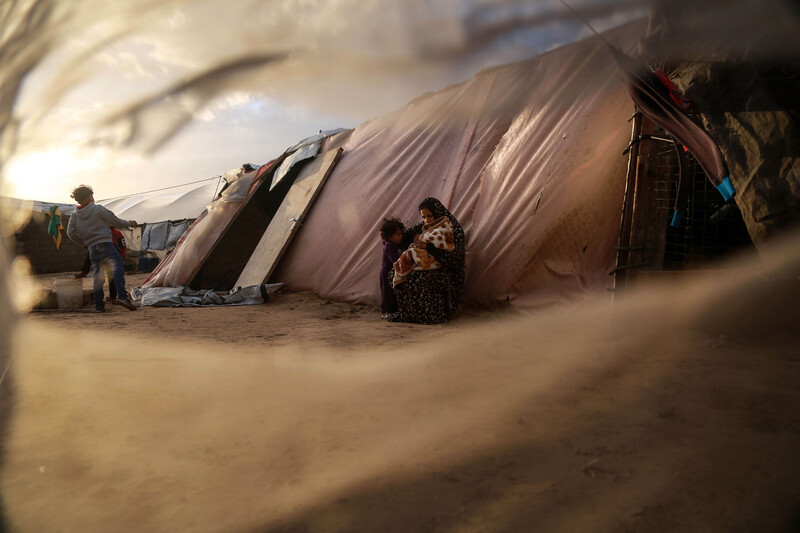
Palestinians stand outside their dwelling after it was damaged during a winter storm, Rafah, southern Gaza Strip, 19 January.
APA imagesIsraeli occupation forces killed six Palestinians during the first month of 2018. Four of those killed were children under the age of 18.
One Israeli – a rabbi living at a settlement outpost not authorized by the Israeli government – was killed by suspected Palestinian gunmen during the same period.
A Palestinian man was killed in what Israel claimed was a search operation in pursuit of Ahmad Nasr Jarrar, who they suspect to be involved in the 9 January slaying of the Israeli settler.
Ahmad Nasr Jarrar’s 31-year-old cousin, Ahmad Ismail Jarrar, was killed during the massive military raid on the Wadi Burqin neighborhood near the northern West Bank city of Jenin beginning on the night of 17 January and ending the next morning. Three homes belonging to the extended Jarrar family were destroyed during the operation.
Israel has held Ahmad Ismail Jarrar’s body and in the weeks following his slaying, the military raided homes in the Jenin area in search of Ahmad Nasr Jarrar.
Another Palestinian man, Ahmad Abd al-Jaber Salim, 28, was killed by Israeli forces during confrontations between youth and the military near Jayyous village in the northern West Bank on 15 January.
According to the Palestinian rights group Al-Haq, a soldier shot Salim in the back of his head with a live bullet while the university student was collecting stones from the ground, his back turned to the soldiers.
Israeli soldiers shoot children in the head
The four Palestinian children killed during the month were shot during protests and confrontations with soldiers.
Musab Tamimi, 16 years old, died after he was shot in the neck during confrontations in the central West Bank village of Deir Nitham on 3 January. He was the first Palestinian killed by Israeli forces in 2018.
An Israeli army spokesperson repeatedly stated that soldiers opened fire on an “armed rioter” without corroborating that claim, which was refuted by the boy’s family.
One week after Tamimi’s death, Israeli soldiers reportedly vandalized posters commemorating the slain teen in the village of Deir Nitham.
Amir Abd al-Hamid Abu Musaad, 15, died immediately after being hit in the chest with a live bullet during a protest along the Gaza-Israel boundary on 11 January, according to Defense for Children International-Palestine.
That same day, Ali Omar Nimer Qinu, 17, was shot with a live bullet in the head during confrontations between Palestinians and soldiers near Nablus in the northern West Bank.
Laith Abu Naim, 16, died after he was hit in the head with live ammunition fired by a soldier in the West Bank village of al-Mughayyer, near Ramallah, on 30 January. The boy was reportedly shot after throwing stones at an army vehicle that had entered the village, the UN monitoring group OCHA stated.
Palestinian prisoner Hussein Husni Atallah, 57, died of cancer on 20 January after more than two decades in Israeli detention. An Israeli court denied repeated requests from Atallah’s lawyers to release him, despite medical reports from the Red Cross and the prison doctor attesting to the severity of his illness.
Fishermen, farmers under fire
Palestinian fisherman Abdullah Ramadan Zeidan, 33, was shot in the chest and killed by the Egyptian Navy off the coast of the southern Gaza Strip on 13 January in unclear circumstances.
Israeli forces fired on Palestinian fishermen and farmers in Gaza more than 25 times during the month. Nearly 550 Palestinians, 150 of them children, were injured by Israeli forces throughout the West Bank and Gaza during January, according to OCHA.
Approximately 450 Palestinians were detained by Israeli forces during the month, nearly 50 of them children.
Rafah crossing – the sole point of exit and entry for the vast majority of Gaza’s 2 million residents – remained closed during the month.
On 29 January, Beit Hanoun hospital in northern Gaza stopped providing medical care after running out of funds for emergency fuel to run backup generators.
For months hospitals in Gaza have warned of a catastrophe as electricity supplies plunged to new lows, forcing the postponement of surgeries.
“Funding for emergency fuel provided by the UN to critical health, water and sanitation, and solid waste facilities, is expected to be exhausted in a few weeks, at most,” OCHA stated on 2 February.
The Action Group for Palestinians of Syria reported 13 Palestinian deaths in January as a result of the ongoing war in the country. The vast majority of the reported deaths were fighters who were killed in battle alongside Syrian government forces.
One Palestinian, Abdallah Fayiz Diab, was reported to have died as a result of torture in Syrian government detention; his father, the lawyer Fayiz Diab Diab, had also died in prison, according to the monitoring group.
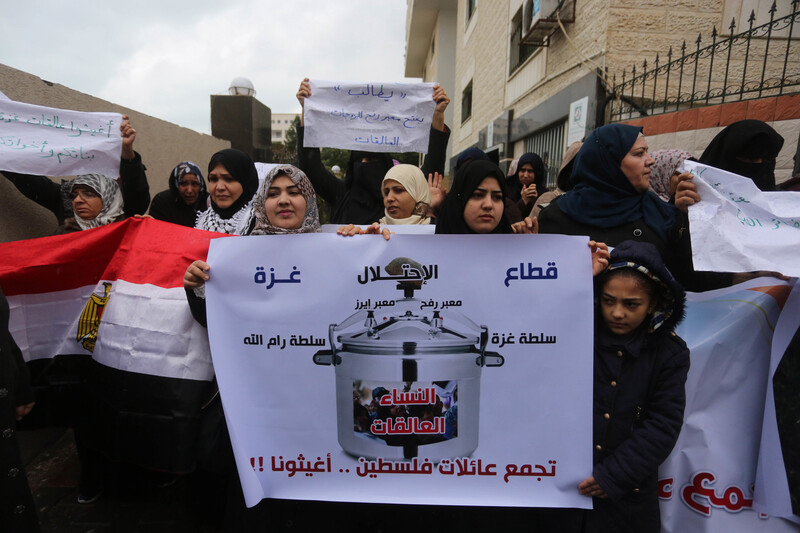
Palestinian women hold a banner likening the situation in the Gaza Strip to a pressure cooker during a protest in Gaza City demanding that Egypt open Rafah crossing, 1 January.
APA images
Palestinians walk on a Gaza City beach during sunset, 3 January.
APA images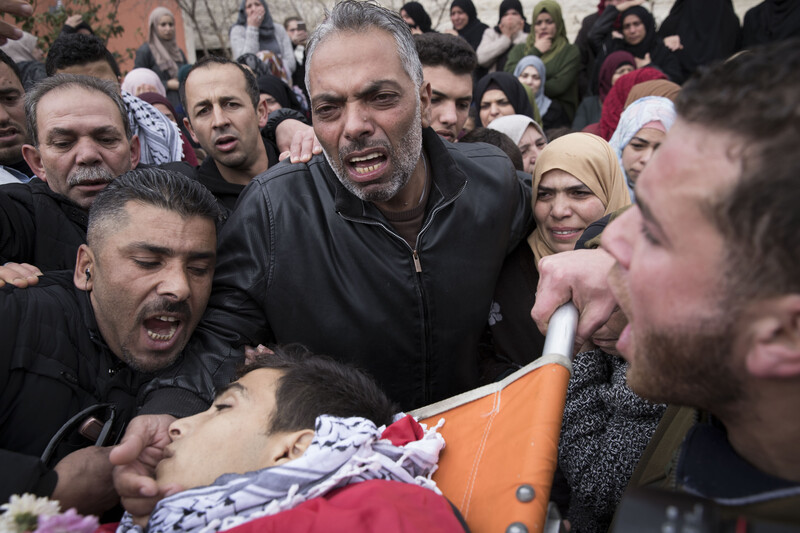
The family of Musab Tamimi, 16, who was shot dead by the Israeli army a day earlier, mourn during the boy’s funeral in the West Bank village of Deir Nitham, north of Ramallah, on 4 January. The teenager was the first Palestinian killed by the Israeli military in 2018.
ActiveStills
Muhammad Tamimi, 15, poses for photos during a gathering to celebrate the release of Nour Tamimi from Israeli detention on 4 January. Muhammad was shot by Israeli soldiers on 15 December, an hour before his cousins Nour and Ahed Tamimi were seen on video confronting Israeli soldiers that invaded their village, an incident that later led to their arrest and the detention of Ahed’s mother, Nariman. Israel continues to hold both Ahed, who turned 17 on 31 January, and Nariman.
ActiveStills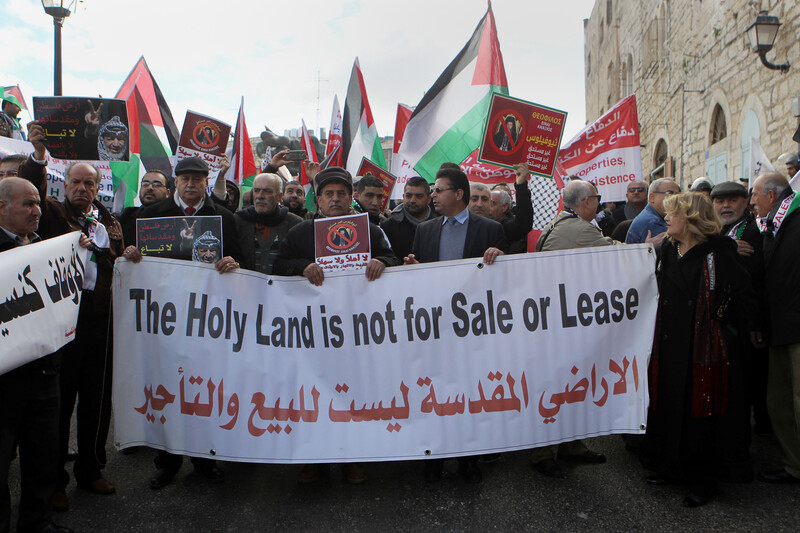
Palestinians protest as the convoy of Jerusalem’s Greek Orthodox patriarch Theophilos III arrives in the West Bank town of Bethlehem on 6 January ahead of Eastern Orthodox Christmas services. The municipalities of Bethlehem, Beit Sahour and Beit Jala, all in the Israeli-occupied West Bank, called for a boycott over the Greek Orthodox patriarch allegedly allowing the sale of church properties in East Jerusalem to Israeli settler groups.
APA images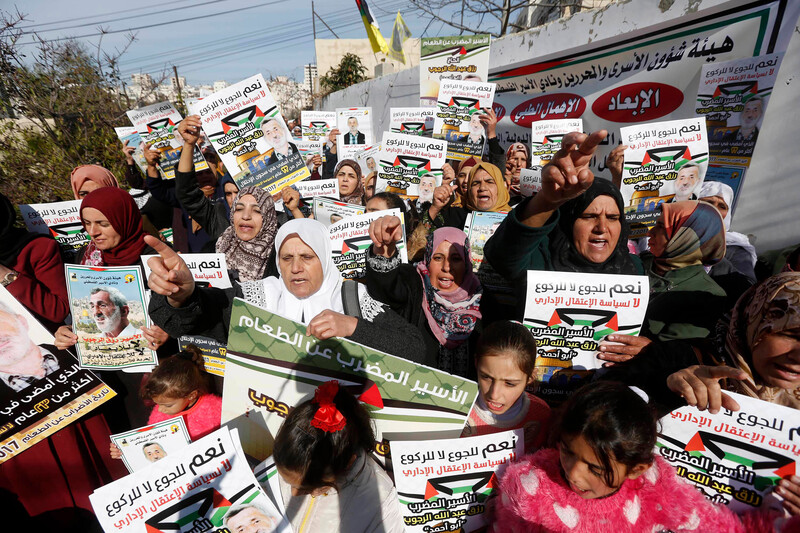
Palestinians hold posters of Rizk Rajoub, who launched a hunger strike on 25 December in protest of his detention without charge or trial by Israel, during a protest in front the Red Cross office in the West Bank city of Hebron on 10 January. According to the solidarity group Samidoun, 61-year-old Rajoub “was offered the choice of indefinitely renewable imprisonment on the basis of secret evidence or deportation to Sudan.” Rajoub has not spent a full year outside of Israeli prison since 1996, his family say. He was most recently arrested by Israel on 27 November 2017.
APA images
Mourners carry the body of Amir Abd al-Hamid Abu Musaad, 16, during his funeral in al-Maghazi refugee camp, central Gaza Strip, on 12 January. The youth was shot dead during confrontations with the Israeli military the previous day.
APA images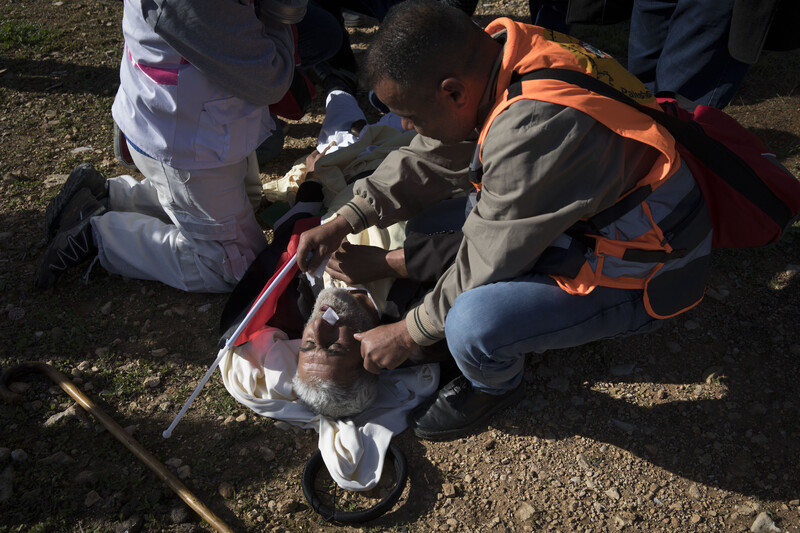
Palestinian medic treats a protester who was injured by tear gas fired by Israeli forces during a protest in the West Bank village of Nabi Saleh calling for the release of Palestinian prisoners from Israeli jails and in solidarity with the women and girls of the Tamimi family held by Israel, 13 January.
ActiveStills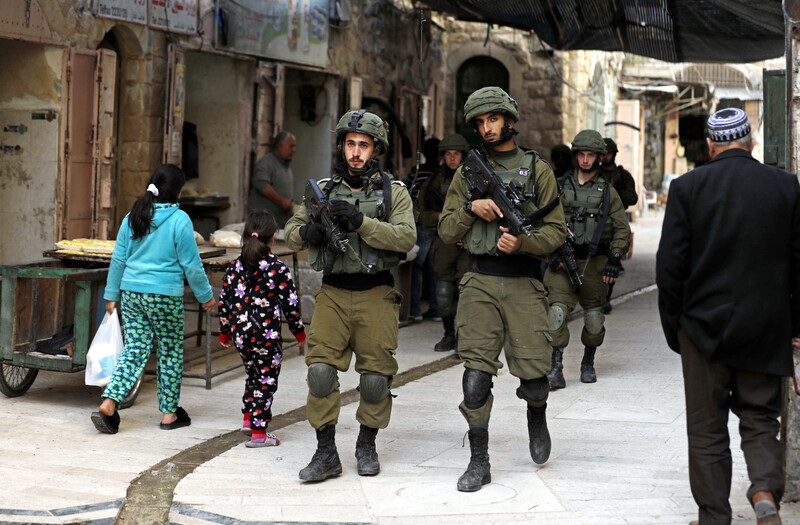
Israeli soldiers patrol a street in the West Bank city of Hebron’s Old City on 14 January.
APA images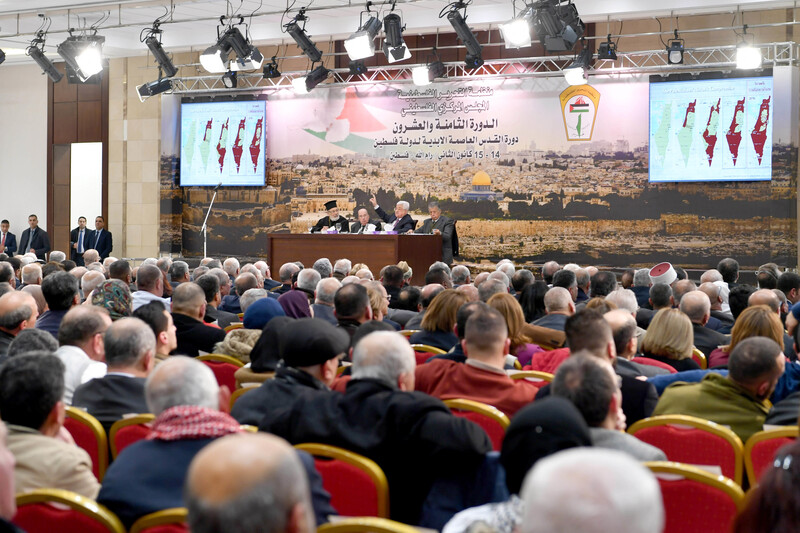
Palestinian Authority leader Mahmoud Abbas gestures during a meeting in the West Bank city of Ramallah on 14 January. During a two-and-a-half-hour speech Abbas declared that “today is the day that the Oslo accords end.”
APA images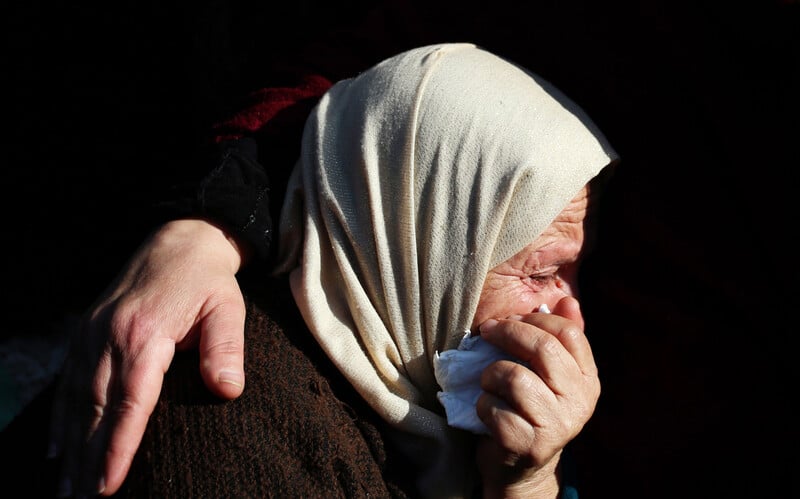
A Palestinian woman mourns during the funeral of Ahmad Abd al-Jaber Salim, who was shot dead by Israeli soldiers the previous day in the West Bank village of Jayyous, near Qalqilya, 16 January.
APA images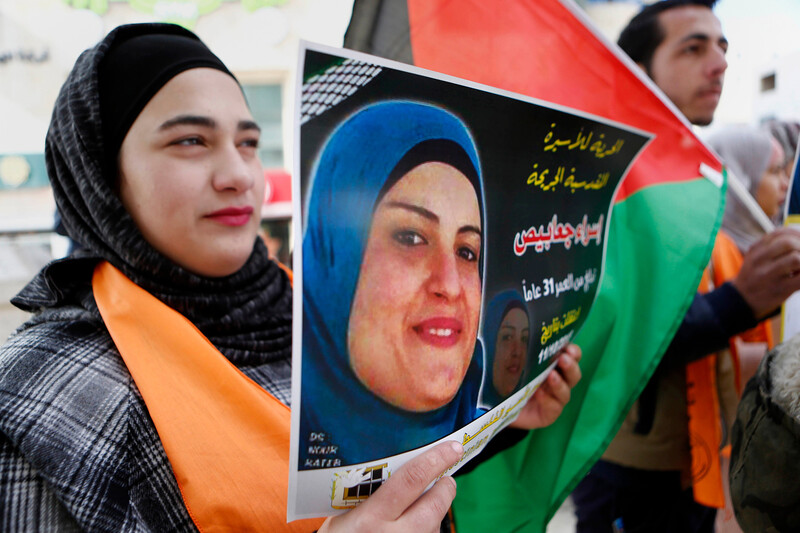
Palestinians protest in solidarity with Israa Jaabis, held prisoner by Israel, in the West Bank city of Hebron on 16 January. Jaabis, from occupied East Jerusalem, sustained severe burns and other injuries after a cooking gas canister she was transporting caused a fire in her car in October 2015. Israel accused her of attempting to detonate the car when she was hundreds of meters away from an Israeli checkpoint.
APA images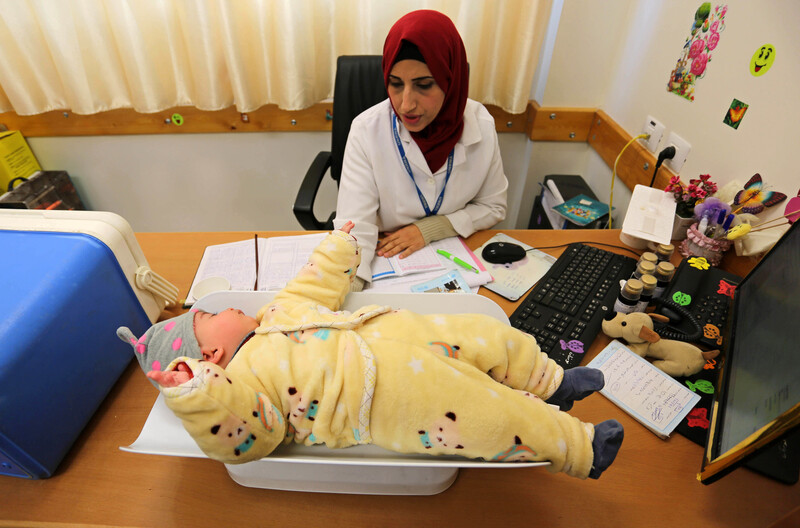
A Palestinian doctor treats a child at a clinic run by UNRWA at Gaza City’s al-Shati refugee camp on 18 January. The Trump administration withheld $110 million in planned funding to the agency, which provides essential health and education services to five million Palestinian refugees, in an attempt to extract political concessions from the Palestinian Authority leadership.
APA images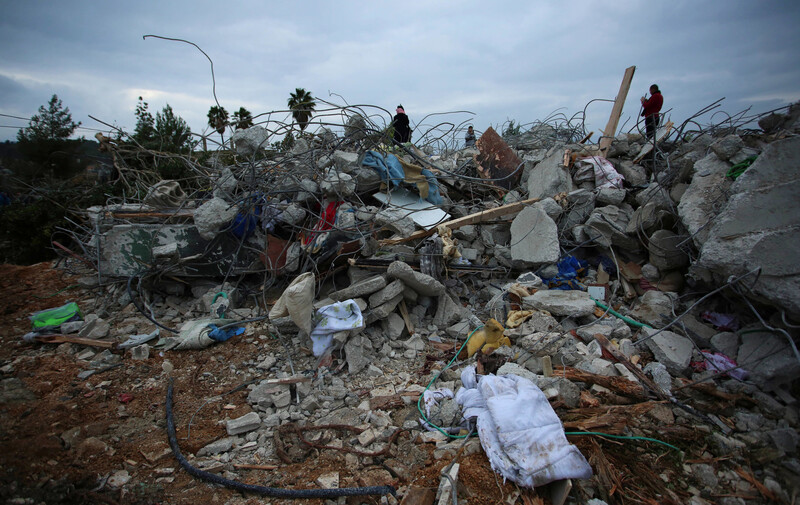
Palestinians stand on the rubble of a home destroyed by the Israeli army in a massive overnight raid near the northern West Bank town of Jenin, 18 January. Ahmad Ismail Jarrar, the cousin of a man wanted by Israel over the fatal shooting of a settler, was killed during the operation.
APA images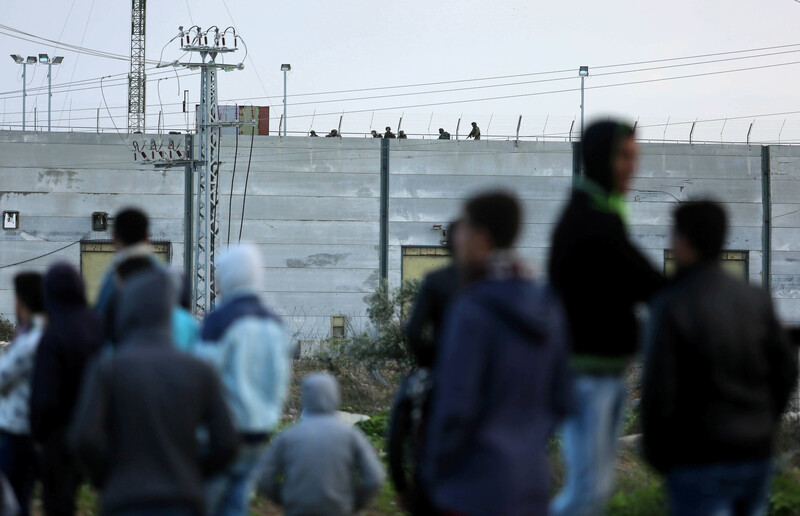
Palestinian protesters confront Israeli occupation forces near the Gaza-Israel boundary on 19 January amid ongoing demonstrations over the Trump administration’s recognition of Jerusalem as Israel’s capital.
APA images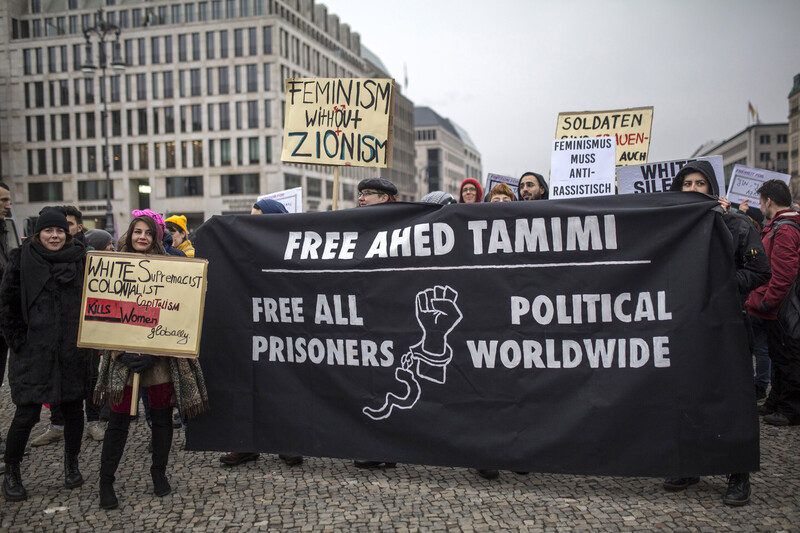
Activists hold banners and posters in support of Ahed Tamimi during a women’s march in Berlin, Germany, on 21 January. The demonstration was organized in solidarity with women marchers around the world, focusing on “standing up for women’s rights and for groups that feel marginalized.”
ActiveStills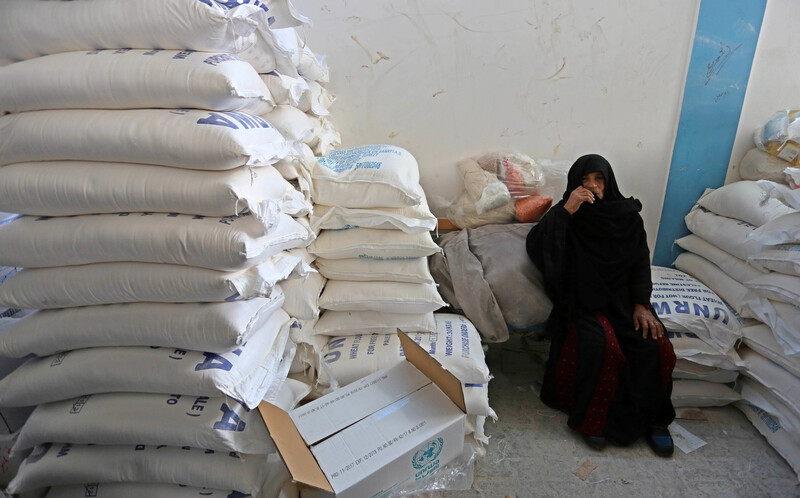
A Palestinian refugee waits to receive aid at a United Nations food distribution center in Jabaliya, in the northern Gaza Strip, on 24 January. The Trump administration withheld $110 million in planned contributions, precipitating what the agency has called “the worst financial crisis in UNRWA’s history.”
APA images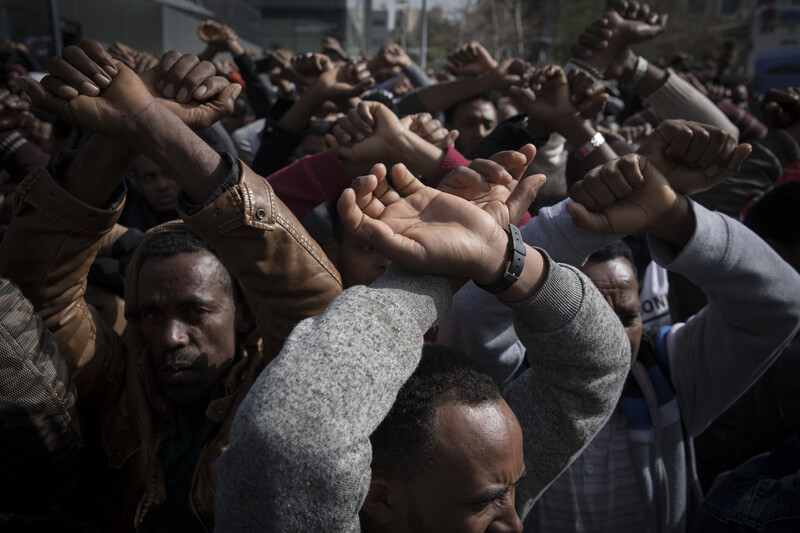
Asylum seekers from Sudan and Eritrea protest Israel’s plans to forcibly deport tens of thousands of African refugees, reportedly to Rwanda, outside Rwanda’s embassy in Herzliya, near Tel Aviv, on 22 January.
ActiveStills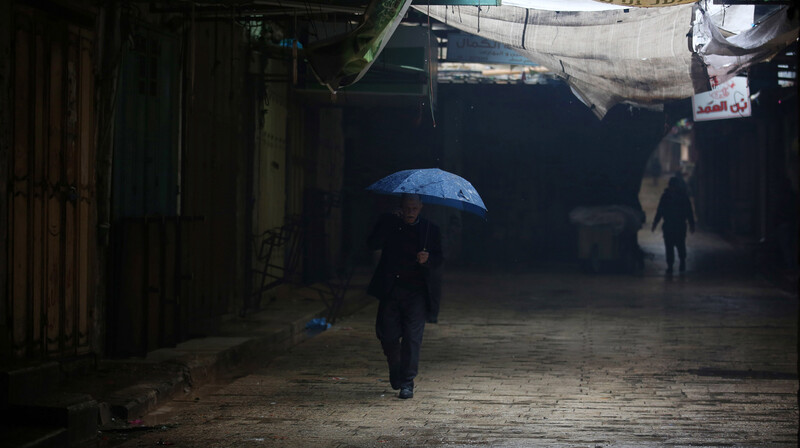
Palestinians walk past closed shops in the West Bank city of Nablus during a strike in protest of US Vice President Mike Pence’s visit to Israel and Jerusalem, 23 January.
APA images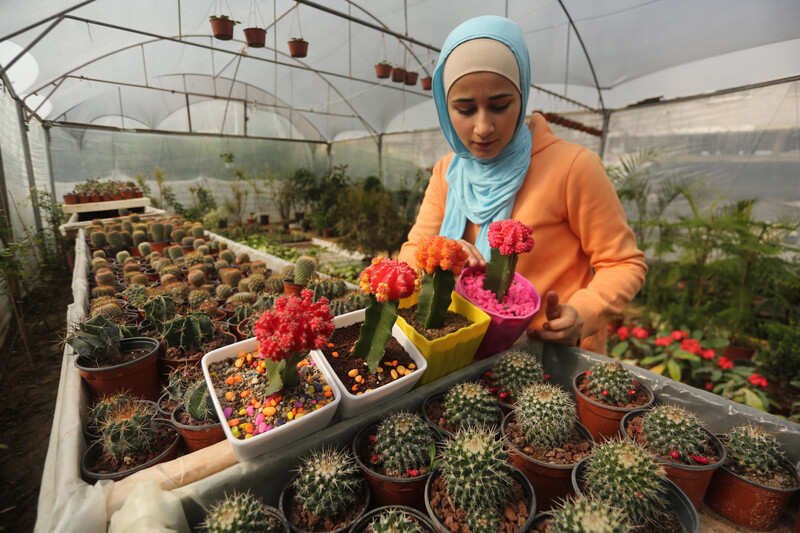
A Palestinian woman holds a tray of miniature cacti at a nursery in Jabaliya in the northern Gaza Strip on 25 January.
APA images
An Israeli police officer stands at the entrance of the interior ministry in South Tel Aviv after activists poured red paint on its entrance and placed prop heads symbolizing refugees who will be sent to their deaths in protest against the government’s plan to forcibly deport African asylum seekers, 27 January.
ActiveStills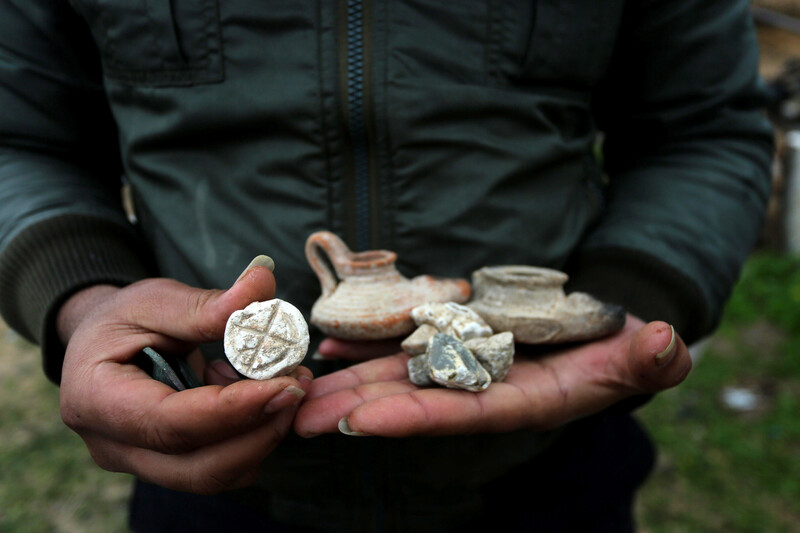
A Palestinian man holds pottery fragments at a newly discovered cemetery in the northern Gaza Strip town of Beit Hanoun, 27 January. Experts said the graves were part of a tomb that possibly dates from the Late Roman-Byzantine era in the fourth to sixth century CE, when Gaza was part of the far-flung Roman Empire.
APA images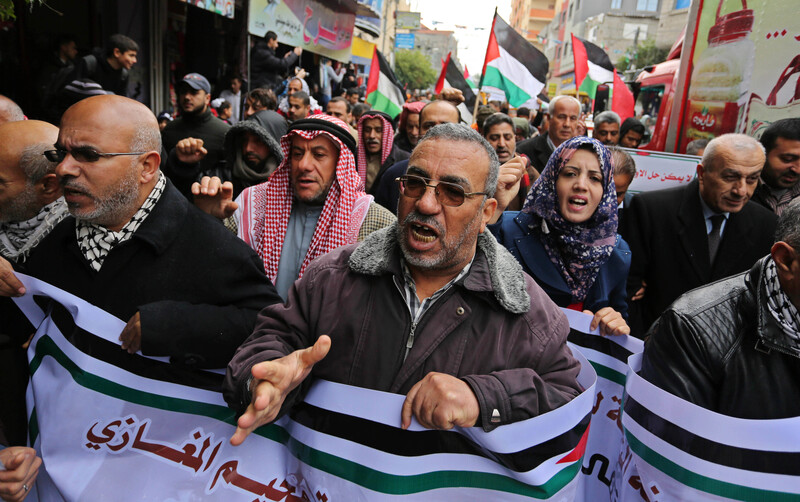
Palestinians in the central Gaza Strip’s al-Maghazi refugee camp protest US President Donald Trump’s decision to recognize Jerusalem as the capital of Israel and freeze tens of millions of dollars in funding to UNRWA, the UN agency for Palestine refugees, 27 January.
APA images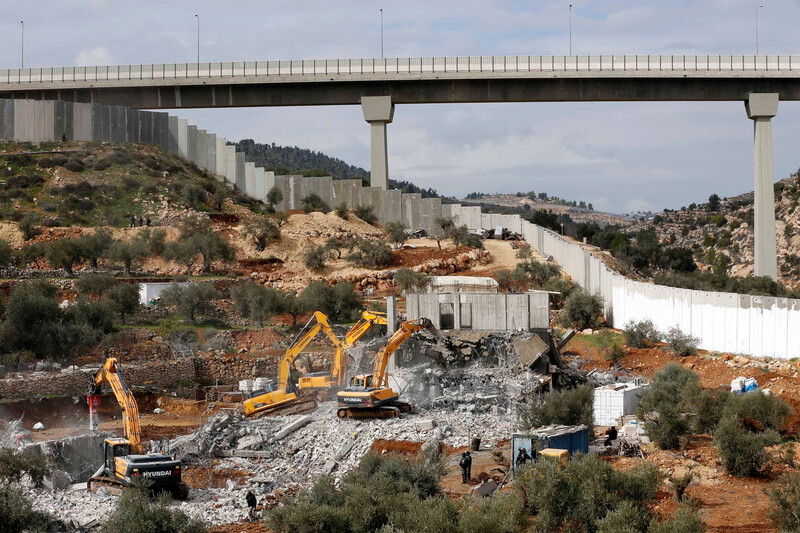
Israeli forces demolish two Palestinian residential buildings under construction in the West Bank town of Beit Jala, near Bethlehem, on 29 January.
APA images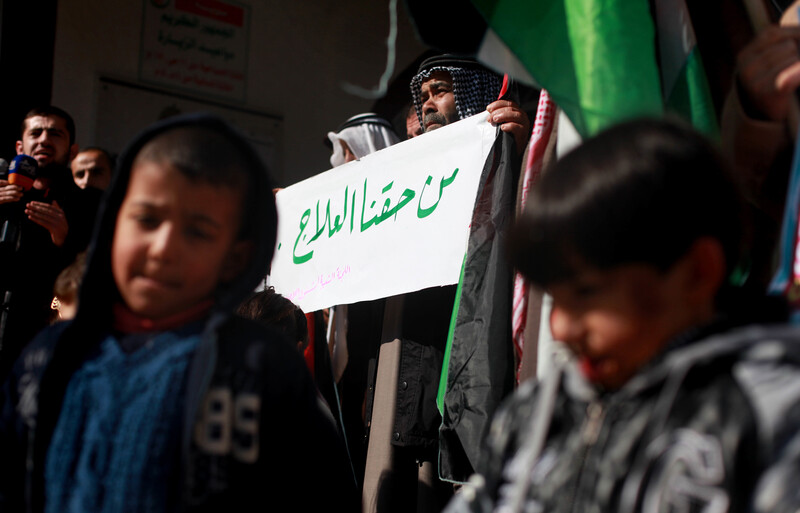
A Palestinian man holds a sign reading “We have the right to treatment” during a protest against worsening health conditions and the decade-long Israeli blockade in Jabaliya, northern Gaza Strip, 30 January.
APA images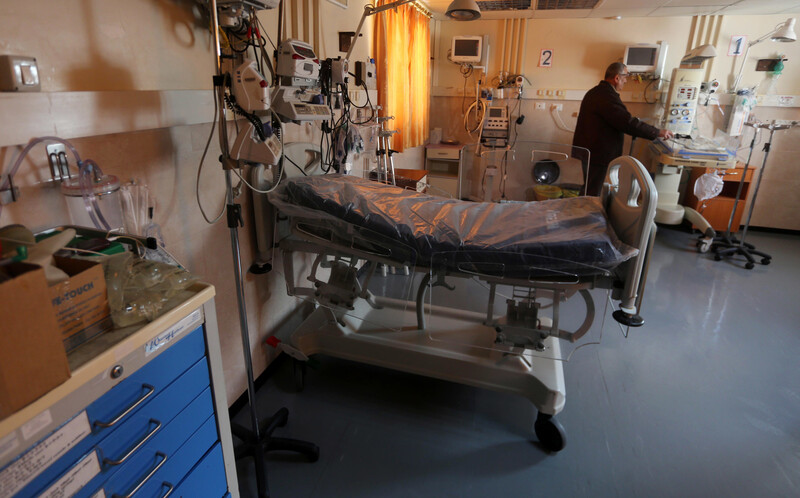
A health ministry employee inspects the Muhammad al-Dura pediatric hospital in Gaza City after it ran out of fuel, 31 January. For months Gaza’s health ministry has been warning that it will be forced to reduce health services and take austerity measures because it lacks fuel to run generators amid a greater chronic electricity shortage across Gaza.
APA images

